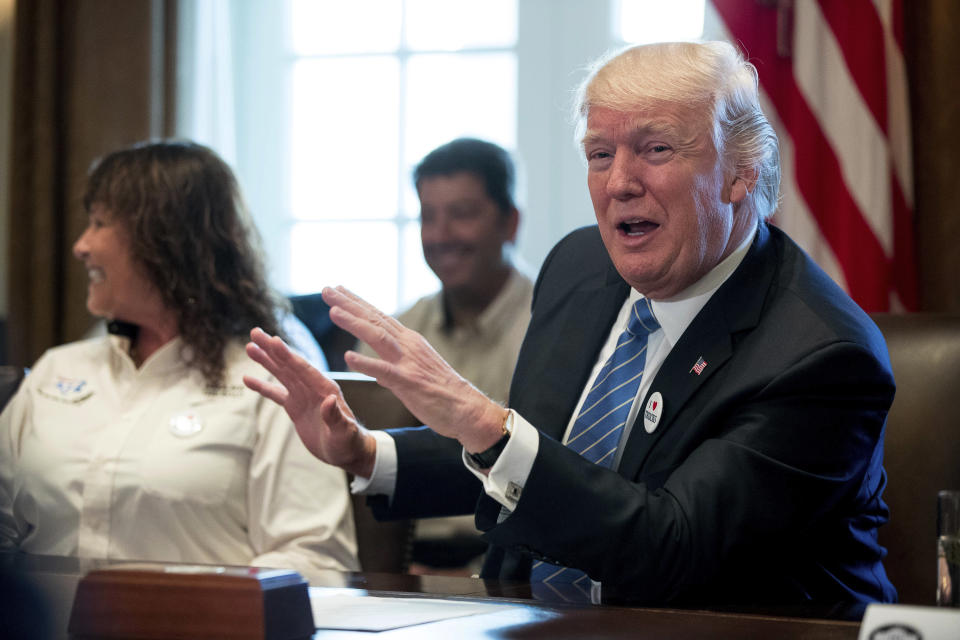Why a healthcare bill failure won't kill the Trump rally

Since Donald Trump’s election as president, stocks have been in rally mode. And a failure to pass his administration’s first signature legislation isn’t likely to derail the market rally.
The House of Representatives is set to vote on the American Health Care Act later Friday afternoon. As of late morning, it appeared that the GOP did not have the votes needed to pass the bill.
On Friday morning, stocks in the U.S. were slightly higher but, overall, not doing much ahead of the vote. On Thursday, if you look hard enough, it appeared markets got a bit jittery as the healthcare-related headlines rolled in during the day. But overall, markets appear largely indifferent to the outcome of this vote.
Earlier this week, markets sold off on vague concerns over the ability for this bill to pass which, by extension, cast into doubt the whole of the Trump economic agenda.
However, some analysts saw the sell-off as rooted in more technical factors than any individual headline. And this also falls broadly in-line with the idea that markets and politics are viewing the Trump administration through completely different lenses.
Cutting taxes, spending on infrastructure, and cutting regulations were the pillars markets — as well as businesses and consumers — had gotten so excited about since the election. House leadership, however, began with healthcare. And the market’s logic says that if the first part of the agenda fails, the whole thing is in trouble.
But reports on Thursday said that Trump told House Republicans the AHCA will either pass, or the administration will move on. Which should be great news for markets.
Fears are overblown
As Andrew Hunter, an economist at Capital Economics, wrote on Thursday, “We think fears that the failure of the bill could seriously threaten the rest of Trump’s legislative agenda are overblown.”
Hunter added that, “there is no procedural reason why the failure of the bill would threaten future legislation. The Republicans have chosen to pursue health care reform through a reconciliation bill, which requires only a simple majority to pass the Senate.
“However, only one can be passed each fiscal year. With a reconciliation to the 2017 budget being used for health care, tax reform will be left for a separate reconciliation to the budget for the 2018 fiscal year, which begins in October.”
And so while passing the AHCA might seem to provide a gateway to the rest of the Trump agenda, the reality is that healthcare and tax reform we jammed together out of political, rather procedural, necessity. The ability for lawmakers to act quickly and decisively on tax reform — which was the most obviously positive Trump agenda item for markets — is not hampered by a failure on healthcare.

What’s more, some strategists, including Jonathan Golub at RBC Capital Markets, think the rally we’ve seen in stocks in more about earnings and the economy than hope related to Trump’s agenda.
“Over the last several months, we’ve made the case that reflation and better economics were the primary forces behind the S&P 500’s advance, rather than President Trump’s proposed pro-growth policies,” Golub writes.
Back in January, Neil Dutta, an economist at Renaissance Macro, made a similar argument, writing that, “The euphoria around looser fiscal policy has already faded. In our client meetings, we’ve notice more attention being paid to trade protectionism and tariff policy.
“Yet, here we are with the 10-year USTs holding at 2.50% and the stock market at cycle highs. What does this suggest? For me, it implies that most of the move in the market is the result of stronger growth and the fading of a global disinflationary shock, not the election of Donald J. Trump.” (Emphasis added.)
Since Dutta’s note, the S&P is up about 3%.
Earlier this week, when markets endured their worst day of the year, the hardest-hit sector was financials, which had been the biggest winner since the election. The XLF ETF, which tracks financial stocks, has lost about 3% in the last month is roughly unchanged over the last three months.

And in a note earlier this month, analysts at Goldman Sachs highlighted that baskets of stocks aimed to benefit from infrastructure spending and tax reform were already starting to lose steam.
Looking at the markets, then, the “Trump trade” has already started to lose some steam though broader markets remain in decent shape. And a failure on healthcare isn’t going to change this story.
—
Myles Udland is a writer at Yahoo Finance. Follow him on Twitter @MylesUdland
Read more from Myles here:


